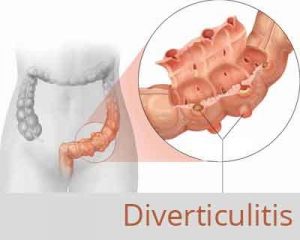- Home
- Editorial
- News
- Practice Guidelines
- Anesthesiology Guidelines
- Cancer Guidelines
- Cardiac Sciences Guidelines
- Critical Care Guidelines
- Dentistry Guidelines
- Dermatology Guidelines
- Diabetes and Endo Guidelines
- Diagnostics Guidelines
- ENT Guidelines
- Featured Practice Guidelines
- Gastroenterology Guidelines
- Geriatrics Guidelines
- Medicine Guidelines
- Nephrology Guidelines
- Neurosciences Guidelines
- Obs and Gynae Guidelines
- Ophthalmology Guidelines
- Orthopaedics Guidelines
- Paediatrics Guidelines
- Psychiatry Guidelines
- Pulmonology Guidelines
- Radiology Guidelines
- Surgery Guidelines
- Urology Guidelines
Which patients of diverticulitis require Surgery?

Surgeons from Birmingham, England examined 5 year National Health Service data of patients admitted with diagnosis of acute diverticulitis to identify factors which prompt need for elective or emergency surgery. They found that Eleven percent of these patients underwent admission for recurrent acute diverticulitis.Younger patients, women, smokers, obese individuals, and those who had diverticulitis with perforation and/or abscess were more likely to develop recurrent diverticulitis and may require surgery. The study has been published in Diseases of the Colon & Rectum .
The authors quote 2004 statistics citing that diverticular disease is responsible for over 300,000 annual hospital admissions and 1.5 million days of inpatient care at a cost of $ 2.6 billion!They identified over 65,000 patients who had been hospitalized for acute diverticulitis between 2006 and 2011. Eleven percent of these patients underwent admission for recurrent acute diverticulitis. Younger patients, women, smokers, obese individuals, and those who had diverticulitis with perforation and/or abscess were more likely to develop recurrent diverticulitis. The authors hope that such a study will help surgeons and other physicians discuss the need and timing of elective surgery with their patients. In addition, some risk factors such as smoking and obesity can be corrected by smoking cessation and weight reduction. This might, in turn, lower the patient’s risk for recurrent diverticulitis and need for surgery.
The authors state “Knowledge of the rates of recurrent acute diverticulitis helps guide this difficult doctor-patient discussion. Patients with modifiable risk factors such as smoking and obesity can be counseled because this may reduce the risk of recurrent acute diverticulitis.”
In the future, we may well see an increased participation by patients in their own healthcare, changing the trajectory of their own health by risk factor modification.
Citation: El-Sayed C, Radley S, Mytton J, Evison F, Ward ST. Risk of recurrent disease and surgery following an admission for acute diverticulitis. Dis Colon Rectum 2018;61(3):382-389.

Disclaimer: This site is primarily intended for healthcare professionals. Any content/information on this website does not replace the advice of medical and/or health professionals and should not be construed as medical/diagnostic advice/endorsement or prescription. Use of this site is subject to our terms of use, privacy policy, advertisement policy. © 2020 Minerva Medical Treatment Pvt Ltd